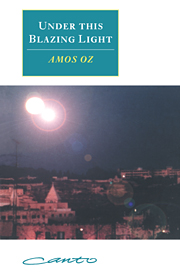Book contents
- Frontmatter
- Contents
- Translator's note
- Preface to the Hebrew edition
- Introduction
- Events and books
- Under this blazing light
- ‘Man is the sum total of all the sin and fire pent up in his bones’
- ‘A ridiculous miracle hanging over our heads’
- The State as reprisal
- A modest attempt to set out a theory
- The meaning of homeland
- The discreet charm of Zionism
- A.D. Gordon today
- Thoughts on the kibbutz
- The kibbutz at the present time
- How to be a socialist
- Munia Mandel's secret language
- Pinchas Lavon
- The lost garden
- An autobiographical note
- An alien city
- Like a gangster on the night of the long knives, but somewhat in a dream
- Notes
- Publication history
- Index of names
The kibbutz at the present time
Published online by Cambridge University Press: 07 September 2010
- Frontmatter
- Contents
- Translator's note
- Preface to the Hebrew edition
- Introduction
- Events and books
- Under this blazing light
- ‘Man is the sum total of all the sin and fire pent up in his bones’
- ‘A ridiculous miracle hanging over our heads’
- The State as reprisal
- A modest attempt to set out a theory
- The meaning of homeland
- The discreet charm of Zionism
- A.D. Gordon today
- Thoughts on the kibbutz
- The kibbutz at the present time
- How to be a socialist
- Munia Mandel's secret language
- Pinchas Lavon
- The lost garden
- An autobiographical note
- An alien city
- Like a gangster on the night of the long knives, but somewhat in a dream
- Notes
- Publication history
- Index of names
Summary
No, I do not believe there is any such thing as a ‘kibbutz literature’. There are poems and books that have a kibbutz setting, and there are poets and writers who live in a kibbutz, but the kibbutz has not inspired any ‘mutation’ of Hebrew literature.
For myself, I am better off, for various reasons, living in a kibbutz than I could be elsewhere, even if kibbutz life exacts its price from me.
If I lived in Jerusalem or Tel Aviv, it is very doubtful whether I would manage to elude the grip of the ‘literary world’, in which writers and academics and critics and poets sit around discussing each other.
Not that this phenomenon is without a certain attraction, it is just that life (as they say) is too short, and if you shut yourself away in ‘literary circles’ you miss something.
People sometimes ask me, both here in Israel and abroad, if Hulda isn't too small for me, and so on. They quiz me about parochial atmosphere, etcetera. They wonder how I cope with wanderlust and the urge for adventure that they imagine writers feel more keenly than other people. But the urge does not necessarily put on its travelling clothes; it can be satisfied by local gossip, by peering obliquely at the lives of different people.
Here I know a very large number of people, about three hundred. I know them at close range, in the way that you can know someone after twenty years in the same place. I can see genetics at work: fathers and sons, uncles and cousins, combinations of chromosomes and the vagaries of fate.
- Type
- Chapter
- Information
- Under this Blazing Light , pp. 125 - 132Publisher: Cambridge University PressPrint publication year: 1995



